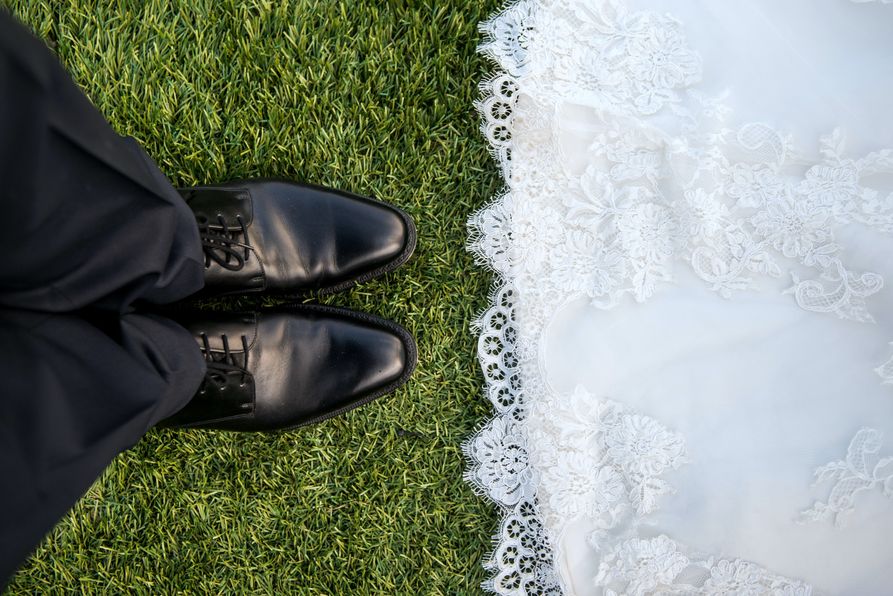Having a wedding ceremony isn’t necessary, to a certain extent. Although the rules vary from place to place, the minimum requirements for getting legally married are to show up in-person with your spouse-to-be, obtain a marriage license, pay a fee, and make it official with an authorized officiant.
Some U.S. states and Canadian provinces also require you to bring 1-2 witnesses with you (Source: USA / Canada). But you certainly don’t need to have a “wedding ceremony” to get married (in terms of pretty words, decor, guests, and all that other pomp and circumstance generally associated with wedding ceremonies). And wedding ceremonies don’t have to be religious or performed by clergy, unless you want them to.
If you aren’t concerned about being legally married, you could always get “wedding’d” instead of “married” which means just holding a commitment ceremony that has zero legal weight. Some couples choose to do something like this with just each other and a chosen officiant present… and it can involve a sand ceremony, a handfasting ceremony, or many other options in lieu of the traditional ceremony. I’ve put together a FREE ceremony guide available to download for couples who need help designing their own ceremonies.
If you’re looking to get married very simply, without a ceremony, this post will answer all of your burning questions!
“Bare bones” Wedding Requirements
What you need to do in order to get legally married will depend on where you live. But for the most part, it’s super simple and straightforward. Just make sure to look up the requirements for your area well in advance.
If you live in the U.S., you can find all of the information you need by state here.
The timing is important for two reasons: (1) Marriage licenses expire after a certain point, so you don’t want to apply for one too early, and (2) some places have a “waiting period” that you must wait between the date you obtain the license and the date you’re allowed to get married. Some people figure out #2 too late and aren’t able to get legally married on the date of their wedding.
The very first thing you need to do is to search for your local state or province’s requirements online. They’ll usually want you, or both you and your partner, to show up in person with some form of identification for the two of you. You’ll be asked to apply for a license and pay a fee.
In British Columbia, where we currently live, the fee for a marriage license is $100 and you can only apply for it within 3 months of your wedding (We’re getting married in Quebec but I was still curious about what the rules are here!) 🙂
Once you have your wedding license, you can choose an officiant who’s authorized to marry people in your area. Finding an officiant is also a matter of doing some Google searching and chatting with friends and family members who may have recommendations. In some areas, you can have a friend or family member become authorized to marry you! And this makes the ceremony, even a quick, simple one, much more personal and meaningful.
Soon after getting married, you’ll receive your wedding certificate proving that you
Cost Effectiveness of NOT Having a Wedding Reception
If you’re considering not having a wedding ceremony (and maybe not a wedding reception either), you’ll save a bunch of money. What good news!
The only thing you really need to pay for is the license and possibly the officiant. So you could potentially have a wedding for between $100 – $200. Certain celebrities have popularized this such as Ali Wong and Kristen Bell… who are both successful women with (as of the time I’m writing this sentence) very successful marriages too!
If you don’t want a ceremony and/or a reception, don’t do it and save your cash for something else you really need or want.
What You Can Do Instead of a Wedding Ceremony
We talked about the bare minimum that needs to happen if you want to get legally married. But what if you want to do something a little more that isn’t quite the same as the traditional wedding ceremony?
These days, you don’t have to have a traditional ceremony but are really free to do whatever you want. You could choose to do what you need to do to get legally wed and then combine that with a special but non-traditional ceremony. Or not get legally wed at all and just do a special, and non-traditional commitment ceremony.
Here are a few different alternatives you might like to use as inspiration:
A hand fasting ceremony: I actually wrote a whole other article on how to have a hand fasting wedding ceremony (a 10-part guide). This is something you may have seen in Braveheart, Outlander, or Game of Thrones. It’s an old Celtic tradition where the couple joins their hands together with cords or cloth, which is then tied into a knot at the end of their vows and kept forever. How romantic is that?
A wishing stone ceremony: This is a ceremony that I wrote about in another post of mine about 13 different kinds of weddings you can choose from (it’s number 5!). You ask each of your guests to hold a stone in their hands, and maybe even write a “wish” for you on them, and then collect them at some point during the ceremony. You can either keep the stones in a jar (especially if they’ve been written on) as a kind of decoration for your home, or your guests can all ceremonially toss them together into a river, ocean, forest… whatever is near by!
A sand ceremony: This is where you have three pretty vases, one empty and two full of different colored sand each. You and your partner, at some point in the ceremony, join your two different colored sands together into the empty vase, representing the beginning of your union. I’ve also seen this done with colored water which is very pretty.
You Can Still Have a Wedding Reception (if you want)
Even if you don’t want a wedding ceremony, you could choose to have a reception, big or small. We were guests at a wedding where the ceremony was TINY, for close friends and family members only, and the reception was a big backyard party for many more guests.
Apparently this is more common in the UK and other places — to have a smaller group attend the ceremony and then have a larger party reception. In the US and Canada, usually all guests come to both events, but it doesn’t have to be that way.
If you don’t want a big party, you could consider having a nice dinner after getting married. Maybe with a couple of friends, or with just the two of you. It’s a nice idea to do a dinner, a picnic, anything big or small that’s a bit out of the ordinary just to mark and celebrate the day in some way.
Of course, if you’re not concerned with any sort of celebration, don’t do it! If you’re not going to miss it and it doesn’t matter at all to the two of you, skip it!
That’s all for now!
I hope this was helpful! Check out some of my other articles for more helpful wedding information or sign up for my newsletter and get an absolutely FREE download of my 10-Page Wedding Ceremony Guide to help you get started designing your ceremony today — whether that means a trip to the justice of the peace, a backyard wedding with 10 people, or a big ol barn wedding with everyone in town 🙂




